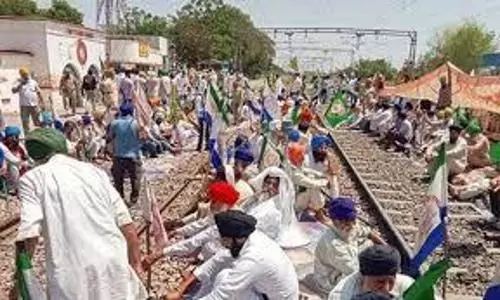
A spectacular victory of Dalit agitation
text_fieldsThe Centre has, after four months, bent its knee before the nation-wide agitation mobilized to recapture the provisions protecting Dalits, contained in the Scheduled Caste and Scheduled Tribe (Prevention of Atrocities) Act, 1989 that were nullified by the Supreme Court verdict issued on 20 March 2018 by Justices U U Lalit and AK Goel.
The decision of the Centre to table a legislation to restore the 1989 Act in its complete form, gives hope and is a victory of Dalit protests. The two-member bench of the Supreme Court was, by nullifying the provisions protecting Dalits, ratifying the allegations raised by the upper castes that the Act was being misused. It is natural for a regressive verdict, delivered without taking into account or realising the caste oppression faced by the Dalit community in India and the humiliating approaches displayed by the judicial system towards them, to trigger a nationwide protest. The biggest and most widespread Dalit protest witnessed by India after the Mandal agitation kickstarted a correction of the Supreme Court verdict and the anti-Dalit approaches of the Central Government, even as there remain apprehensions regarding its future.
In India, misuse of laws is not something new or rare. The misuse of all kinds of laws must be subjected to stringent punishments and compensation measures, whether it is individuals or governments. For, it is the governments in power and their political aides who use the laws and the legislations for their own personal benefits the most while it is the weaker sections and backward classes that fall prey to it. However, the courts and institutions creating popular conscience - which usually do not get upset over such things - are extremely vigilant and hurt when it comes to misuse of provisions protecting Dalits and women. This 'high alertness' frequently bursts out in the form of verdicts and judgements because the courts and the judicial machinery are rooted in the values of casteism and patriarchy. It is in this political context that the question as to why there is no Dalit representation among the senior judges panel that handles the cases related to the safety of lives and legislations of the Dalit communities, becomes relevant. Although demand for a review of the verdict was consistently raised by more than 150 Dalit outfits, different political and social organisations, the central government and different state governments, , the Supreme Court deemed the as a matter to be rejected, and remained unconvinced; this was also because there was not even one among them who could comprehend this social backdrop. The fact that only the elite classes expressed joy in the apex court verdict will help in understanding the caste of that reading.
Although the government introduced a law - the Untouchability (Offences) Act - in 1955, which made practice of untouchability a crime, only in 1989 was it possible to implement the Scheduled Caste and Scheduled Tribe (Prevention of Atrocities) Act, which alone will speak for our inaction in protection of Dalits. Over the last ten years, only 30 per cent of cases charged for attacks against Dalits were proved in courts. Such cases are overturned and get dismissed, and culprits get acquitted, not because the cases are fake, but as a result of discrimination and social pressures that start right from the stage of FIR preparation. There are enough number of studies that vouch for this fact. Even in Kerala, which boasts of enlightenment, out of 47,338 cases, only in 24.9 per cent were the accused convicted. For this very reason, the Supreme Court verdict that annulled the protection for Dalits, caused understandable insecurity among the SC/ST communities and closed all doors before them except agitation. For, the making and unmaking of laws would pave the way to the rise and fall of social communities, as has been illustrated by history of legislation right since British era. Judgments and revision of laws do not happen by accident or on their own. On the other hand, as taught by experience, such legislations stem from socio-political roots aged centuries or millennia. Hence the saying that agitations are a people's call for creating and maintaining laws. In that sense, and in the current Indian situation, the Dalit agitation has won a spectacular victory capable of inspiring all repressed sections.























